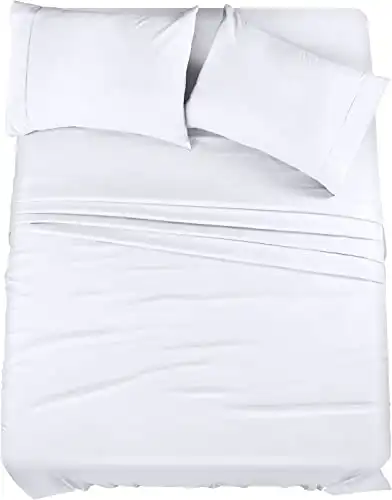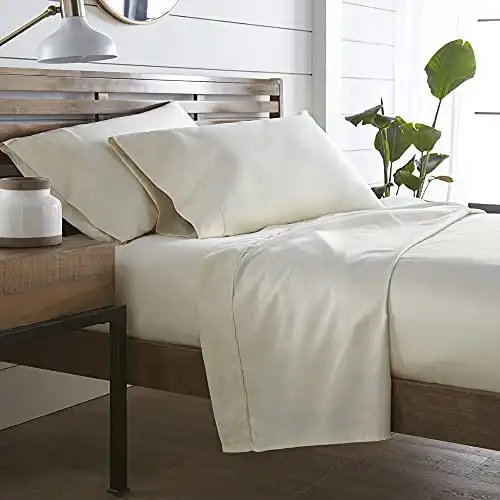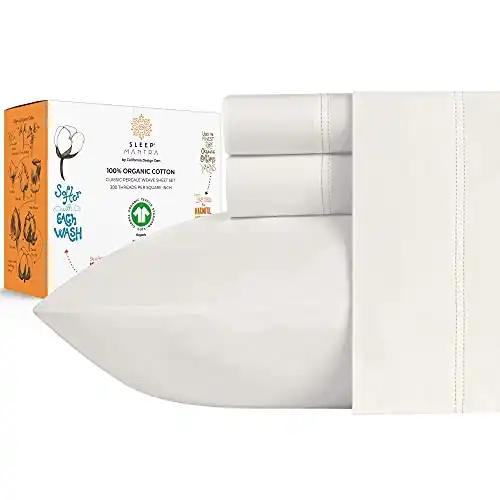- You are here:
- Home »
- Organic Bedding »
- Microfiber vs. Cotton Sheets: What’s the Difference?
Microfiber vs. Cotton Sheets: What’s the Difference?
If you’re in the market for new sheets, you may wonder what fabric is best. Two of the most popular options are microfiber and cotton. Both fabrics have their advantages and disadvantages, so it’s important to choose the one that’s right for you.
Cotton vs. Microfiber Sheets: Comparison
The primary distinction between cotton and microfiber sheets lies in their composition. Cotton sheets are crafted from natural fibers and are renowned for their softness, breathability, and absorbency. Additionally, they tend to be more affordable than microfiber sheets but may necessitate greater care, such as ironing, to maintain their appearance.
On the other hand, microfiber sheets are synthetic, composed of exceptionally fine fibers that result in extreme softness and durability. They are also wrinkle-resistant and easy to maintain. However, being synthetic, microfiber sheets may occasionally feel less breathable than cotton sheets and may not withstand high temperatures as well.
Aspect
Cotton Sheets
Microfiber Sheets
Feel
Comfortable, becomes softer with every wash
Soft and smooth
Breathability
Highly breathable, moisture-wicking
Less breathable, can feel hot and sticky in warm weather
Maintenance
Requires frequent washing, may shrink and wrinkle
Less likely to shrink, wrinkle-resistant
Price
Affordable but more expensive and luxury options are also available
More affordable than cotton
Durability
Strong and durable, less likely to tear or pill
Less durable, more likely to tear or pill over time
Eco-Friendliness
Not as eco-friendly, but organic cotton is a better option
Not eco-friendly, source of microplastics
Safety
May cause skin irritation or allergic reactions if not organic
May contain chemical treatments that can cause skin irritation
Feel
Microfiber sheets are made from a synthetic fabric that is softer than cotton. This makes them more comfortable to sleep on, especially if you have sensitive skin. Additionally, microfiber sheets are less likely to pill or fade over time, so they will stay soft and look new for longer.
Cotton is one of the most popular fabrics used for bedding because it’s soft, comfortable, and breathable. Cotton sheets provide a cozy sleeping experience that won’t irritate your skin or leave you feeling too hot at night. Additionally, cotton is a natural fabric that doesn’t trap odors like synthetic fabrics can.
Cotton sheets get softer with each wash, making them even more comfortable over time. This is because the fibers in cotton become more flexible as they are washed and dried.
Winner: Cotton
Breathability
Microfiber is a very dense fabric, which means it doesn’t breathe as well as other fabrics. This can make microfiber sheets feel hot and sticky, especially in warm weather. Although they´re very absorbent, they may be more prone to long-lasting stains that will be difficult to remove.
Cotton is a highly absorbent natural fabric with moisture-wicking properties. This can help keep you cool and dry at night, making cotton sheets a great option for hot sleepers or people in humid climates. Additionally, the breathable nature of cotton sheets helps to regulate your body temperature so you can stay comfortable throughout the night.
Winner: Cotton
Maintenance
Because microfiber sheets are made from synthetic fibers, they are less likely to shrink when washed than cotton sheets. This means you can wash them hot without worrying about them coming out of the dryer too small. They’re a great choice if you need low-maintenance sheets.
Another benefit of microfiber sheets is that they are wrinkle-resistant. This means you won’t have to spend as much time ironing or steaming them before making your bed. Additionally, microfiber sheets are less likely to develop wrinkles over time, even if you don’t regularly iron them.
Cotton sheets must be washed frequently to maintain their softness and warmth. You may need to iron them, too, to keep them looking neat and pristine. This can be time-consuming and labor-intensive if you don’t have much time to devote to laundry. When cotton sheets are not washed properly or dried on high heat, they may shrink over time.
This can make them less comfortable and affect how they fit on your bed. Additionally, if you’re using bed sheets made from 100% cotton, you won’t be able to stretch them back into shape once they’ve shrunk.
Winner: Microfiber
Read More: How to Wash Cotton Sheets?
Price
Microfiber sheets are typically more affordable than other types of bedding, such as silk or Egyptian cotton sheets. This makes them a great option if you’re looking for high-quality bedding on a budget.
Cotton sheets are easily available and affordable, making them a great choice if you’re looking for high-quality bedding on a budget. Additionally, cotton is one of the most common fabrics used in the home, so it’s easy to find sheets that match your decor.
However, if you want more luxurious sheets, you’ll likely have to pay more for higher thread counts and organic fabrics. For example, Egyptian cotton sheets have a higher thread count than some conventional cotton sheets and are more expensive than regular cotton sheets.
Winner: Microfiber
Durability
One of the primary disadvantages of microfiber sheets is that they’re not as durable as other types of sheets, such as cotton or linen. Microfiber is a synthetic fabric, and like all synthetic fabrics, it’s not as strong as natural fabrics. As a result, microfiber sheets are more likely to tear or pill over time.
Cotton is one of the strongest fabrics, so it’s less likely to tear or pill over time like some other fabrics can. Organic cotton sheets are even more durable than conventional ones because they haven’t been treated with chemical dyes or softeners.
Winner: Cotton
Eco-Friendliness
Since microfiber is synthetic, it’s not as eco-friendly as natural fabrics like cotton or linen. Synthetic fabrics are made from petroleum products, which are not renewable resources.
Additionally, synthetic fabrics often require more energy and water to produce than natural fabrics. As a result, microfiber sheets have a larger carbon footprint than other types of sheets.
The downside of cotton sheets is that they’re not as eco-friendly as other fabrics like hemp or linen. Cotton requires a lot of energy and water to produce, and most conventional cotton is grown using chemical pesticides and fertilizers.
However, if you choose GOTS-certified organic cotton sheets, you’ll get the same softness and comfort without the environmental impact.
Winner: Cotton (as long as you choose organic)
Safety
Microfiber can be toxic when exposed to heat and moisture, so it may not be the best choice for chemically sensitive people. Additionally, some microfiber sheets contain chemical treatments that may cause skin irritation or allergic reactions in some people.
Conventional cotton is usually bleached and treated with chemicals, which may cause some people skin irritation or allergic reactions. Organic cotton is the safest option for people sensitive to chemicals because it’s not treated with any harsh dyes or chemicals.
Winner: Cotton (but choose organic)
Read More: Polyester vs Cotton Sheets
Microfiber vs. Cotton Sheets: Which One Is Better?
When it comes to choosing between cotton and microfiber sheets, the decision depends on your needs and preferences. Cotton is softer, more breathable, and longer-lasting than microfiber.
However, it’s also less wrinkle-resistant and requires frequent washing. Microfiber sheets, on the other hand, are more affordable, wrinkle-resistant, and easier to care for than cotton.
So choose cotton sheets if:
- You’re looking for a soft and cozy fabric that’s breathable and durable
- You’re a hot sleeper or live in a humid climate
- You don’t mind the extra care and maintenance
Choose microfiber sheets if:
- You’re on a budget
- You want wrinkle-resistant bed sheets
- You don’t have much time to devote to laundry and maintenance.
- You don’t sweat much at night.
FAQs
How often should I wash my cotton sheets?
A: Cotton sheets should be washed every 1-2 weeks to maintain their softness and warmth. If you don’t want to wash them that often, try spot-cleaning any spills or stains as soon as possible to help keep them clean for longer.
How often should I wash my microfiber sheets?
A: Microfiber sheets should be washed every 1-2 weeks or as needed. Unlike cotton sheets, they don’t need to be ironed and require less frequent washing to maintain their softness.
Read More: Microfiber Sheets Pros and Cons
Is it better to buy organic cotton sheets?
A: Yes, if you care about the environment and want to reduce your impact, it’s best to buy GOTS-certified organic cotton sheets. Organic cotton is grown without chemicals, so it’s better for the environment and safer for you and your family.
What’s the difference between Egyptian cotton and regular cotton sheets?
A: The main difference is the quality. Egyptian cotton is longer, finer, and softer than regular cotton, so it has a luxurious feel that’s perfect for those who want a higher-end bedding experience.
It is also more durable and lasts longer than regular cotton sheets. However, Egyptian cotton sheets usually come with a higher price tag, so keep that in mind when deciding.
How can I make my cotton sheets softer?
A: To soften your cotton sheets, wash them in hot water with a fabric softener and dry them on low heat. This will help to break down the fibers and make them even softer! Additionally, adding a few drops of essential oil to the wash or dryer can help to make your bed sheets smell even better.
Read More: How to Keep Sheets on Your Bed?
Are cotton sheets good for hot sleepers?
A: Yes, cotton sheets are a great option for hot sleepers. Cotton is breathable, so it helps to wick moisture away from the skin and keep you cool at night. Additionally, if you choose organic cotton sheets, they’ll be even softer and more breathable. So if you’re a hot sleeper, cotton is definitely the way to go!
Are microfiber sheets better than cotton?
A: It depends on your needs and preferences. Microfiber sheets are less expensive, more wrinkle-resistant, and easier to care for than cotton sheets.
However, they are not as soft and breathable, so cotton may be the better option if those are important factors for you. Ultimately, it comes down to your individual needs and budget!
Read More: Best Organic and Non-toxic Printed Sheets
What is Thread Count?
Thread count measures the number of threads per square inch in a cotton sheet. Generally, the higher the thread count, the softer and more durable the sheet will be. High thread count sheets also tend to be more expensive, so if you’re on a budget, look for sheets with a lower thread count.
A thread count of 200-400 should be plenty comfortable and soft enough for most people. It’s important to remember that the fabric’s quality is just as important as the thread count, so always check the fabric composition before you buy.
What is GSM?
Microfiber sheeting is usually measured in GSM, which stands for grams per square meter. The higher the GSM, the heavier and more durable the sheet will be. A microfiber sheet with a GSM of 175-200 should be comfortable and long-lasting. It’s important to note that higher GSM sheets tend to be warmer, so if you sleep hot, then look for a lower GSM.
How to Shop for Organic Cotton Sheets?
A: When shopping for organic cotton sheets, look for GOTS-certified organic cotton. This certification indicates that the fabric was produced in an environmentally friendly way and safe for workers.
You can also find organic cotton sheets with USDA organic certification, which also indicates that the fabric was produced using sustainable methods.
Read More. Cotton vs Bamboo Sheets
Microfiber vs. Cotton Sheets: Bottom Line
In conclusion, microfiber and cotton sheets have both pros and cons. Microfiber sheets are softer than cotton sheets, more absorbent, wrinkle-resistant, and easier to care for. However, they are not as breathable or durable as cotton sheets.
Ultimately, the decision between cotton and microfiber sheets comes down to personal preference. Consider your needs, budget, lifestyle, and local climate when choosing!
Overall, both types of bed sheets can be great options depending on your specific needs. If you’re on a budget or don’t have time for regular maintenance, microfiber sheets may be the best choice for you.
However, cotton is the way to go if softness and breathability are important. No matter which type of sheet you choose, enjoy your new bedding!
Read More: Cotton vs Eucalyptus Sheets
About the Author Kamila Flieger
My name is Kamila, and I'm passionate about researching non-toxic, organic products for the home. I believe it's so important to create a safe and healthy environment for our families, and I enjoy helping others do the same.




